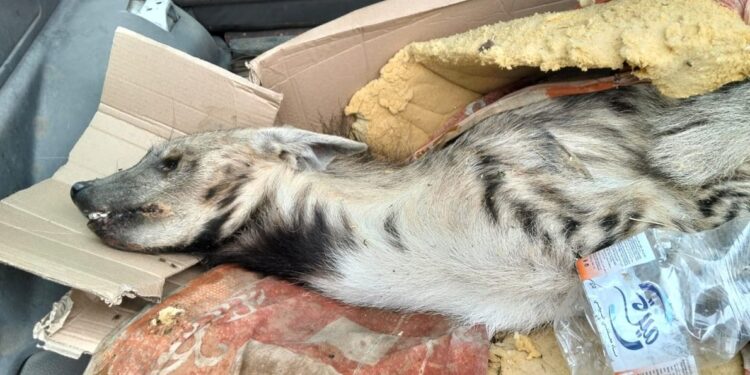A coordinated intervention between the forestry services, the police and veterinarians made it possible to save a rare and protected animal, victim of poaching and destined for occult practices.
Capture and arrests in Grombalia
On October 7, 2025, the security services of Grombalia (Nabeul governorate) arrested nine individuals in possession of a striped hyena, a rare and protected species. According to the first elements of the investigation, the group intended to use the animal for the purposes of witchcraft and charlatanism.
The animal had been captured using homemade traps, causing serious injuries to its limbs. The rapid intervention of Nabeul forestry service agents, in coordination with the General Directorate of Forests and the El Haouaria wild animal breeding center, made it possible to rescue the hyena and urgently transfer it to a specialized veterinary clinic.
A complex veterinary operation
On site, a team of veterinarians carried out a delicate surgical procedure to treat the animal’s injuries, before placing it for observation at the El Haouaria center, where its state of health is now stable.
The courts, for their part, ordered the detention of the nine suspects for illegal possession of a protected animal, witchcraft practices and fraud. The investigation is continuing to determine the existence of possible wildlife trafficking linked to these practices.
The General Directorate of Forests welcomed the mobilization of all parties involved in this exemplary rescue, while inviting citizens to report any act of mistreatment or capture of protected species. She recalled that wildlife constitutes a national asset to be preserved.
An almost extinct species from Tunisia
The striped hyena (Hyaena hyaena), although long present in the arid and semi-arid regions of southern Tunisia, has now almost disappeared from the territory. No confirmed sightings have been reported in the south for more than two decades, although isolated cases have been reported, notably in 2016 on national road No. 5 between Testour and El Kef.
This species, which favors savannahs, meadows and shrubby areas, generally avoids dense forests and open deserts. Classified as “near threatened” by the International Union for Conservation of Nature (IUCN), it remains protected by Tunisian law, despite the persecution to which it is subject due to false beliefs and witchcraft practices.








